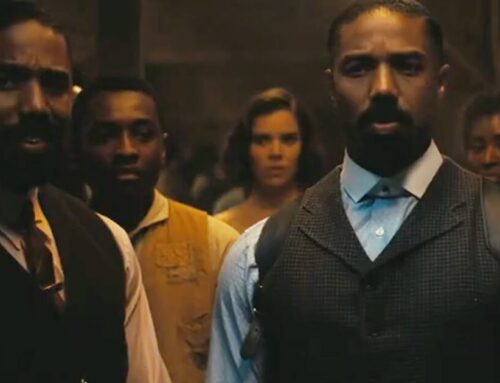I have seen LINCOLN– and he is Daniel Day-Lewis. This is an absolutely flawless performance, which together with Spielberg’s direction, Tony Kushner’s screenplay, based in part on Doris Kearns Goodwin’s book TEAM OF RIVALS, and a treasure trove of vivid performances — has resulted in one of the finest movies of the year, and one of cinema’s most revealing historical epics.
LINCOLN is set during a very specific period of our 16th president’s tenure, when Lincoln and the congress were fighting over whether to pass the 13th amendment which would abolish slavery forever. The miracle is how what sounds like a history lesson is utterly exciting and accessible here. Through this narrow lens, we gather a universe of understanding– not only about Lincoln as a politician, as a man, husband, and father, but also about where we as a country came from, what “Republican” used to mean, and how the issues at stake reverberated through the war-torn union of the 1860’s to the present day.
The film– all 2 hours and 29 minutes– is instantly alive in its opening sequence, a gruesome, closely observed, hand to hand civil war battle. The visceral shock and visual style of these scenes call to mind the opening scenes of Spielberg’s SAVING PRIVATE RYAN. That Spielberg almost immediately loses us with a stilted, mawkish scene involving black and white soldiers talking to Lincoln on the battlefield– and even reciting the Gettysburg address (I actually felt a little nauseous here), is almost immediately followed–thank God– by the rest of the film which Spielberg directs with his extraordinary capacity for finding the pivotal moments, eliciting the best from his actors, and laying out the drama. He does so with exceptional clarity–with the help of Kushner’s scrupulous screenplay–and takes his time letting us absorb the details of the process and the thinking (Lincoln’s and his opponents), behind the political maneuvering.
None of this would have been as effective if the actor at its core weren’t so damn convincing. Daniel Day-Lewis, astonishingly, embodies the person– not the icon, not the archetypal image– but the person who, thanks to Doris Kearns Goodwin’s exhaustive scholarship, we have come to know as Abe Lincoln. Day-Lewis conveys a man with an uncompromising moral compass, tempered by the wily pragmatism of a self-taught country lawyer.
He was of the times, but somehow above the fray–reflected in his sly sense of humor, a function of his ability to keep some distance from the chaos around him. Lincoln’s penchant for storytelling reveals a great, synthesizing mind that worked metaphorically, with an ability to cross purpose its vast knowledge in making decisions. Thus he uses what he knows about Euclid to parse out the “self-evident” equality of the races. At one point in the movie, after Lincoln tells yet another illuminating story, William Seward– his Secretary of State played by David Strathairn– puts his head in his hands and says, “I have no idea what that means.” The audience erupted in laughter.
Day-Lewis makes all of this stone cold real. He gives Lincoln a particular gait, which based on the stance I’ve observed in still photos, had to have been how Lincoln walked and held himself. He gives him a voice– pitched at a tenor, with a slightly twangy inflection, deliberate and gentle. I don’t know what Lincoln sounded like, but I swear he must have sounded like this.
Day-Lewis–despite the potential staginess of the stove pipe hat, the mole on the cheek, and the dour expression–delivers a startling persona: a graceful, thoughtful loner, somehow funny and pained, noble and ribald, simple and cunning– in other words, a deeply intelligent personality capable of losing his temper with his wife, tenderly carrying his son up to bed, and outwitting and intimidating a congress and a cabinet full of seasoned politicos. All of it rings true, and coalesces under the roof of Day-Lewis’s staggering talent. He out-streeps Streep. I have NEVER caught him acting. His gift is alchemical.
And great performances abound here. The high-strung Mary Lincoln is played with piercing intelligence and verve by Sally Field. Mary was indeed a handful for Abe, and we understand the weight of the sorrow she and their relationship endured. Tommy Lee Jones once again gives a performance to be reckoned with– as abolitionist congressman Thaddeus Stevens who wields his considerable power and acumen with relish. Then there’s Joseph Gordon-Levitt, James Spader, Hal Holbrook, John Hawkes, who flesh out every inch of this film with colorful, authentic performances.
The movie falters only occasionally, when Spielberg succumbs to his fear that the audience might not get it unless he leans in hard. He does his best to use John Williams moving score appropriately, tempted as he must have been to let it swell over us, telling us how to feel. But a heavy-handed late scene in which Mary Lincoln apologizes to her husband for her difficult nature is, again, Spielberg making sure we understand just how much trouble she was.
In addition to the sometimes too shadowy and/or gauzy visuals– these were dingy, difficult days before electric lighting–there’s the ending. It’s a tad contrived telegraphing as it does our seeing Lincoln for the last time, followed by a montage of scenes trying to sum up not only the terrible tragedy, but the nobility of his legacy. Lincoln, no doubt, would have had just the right little story to carry us out. But Spielberg is no Abraham Lincoln. As for Daniel Day-Lewis? I’m not so sure.






Leave A Comment
You must be logged in to post a comment.